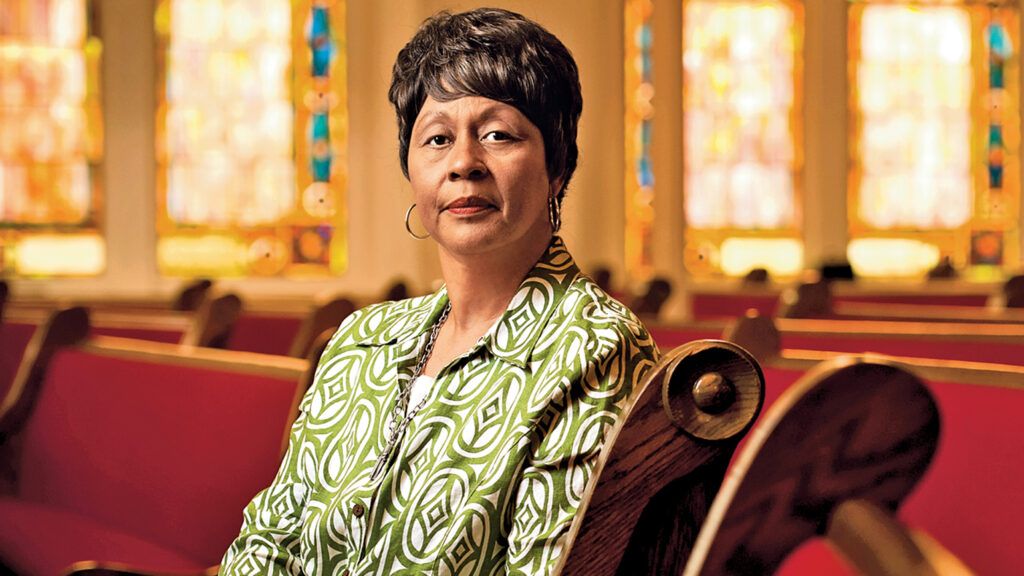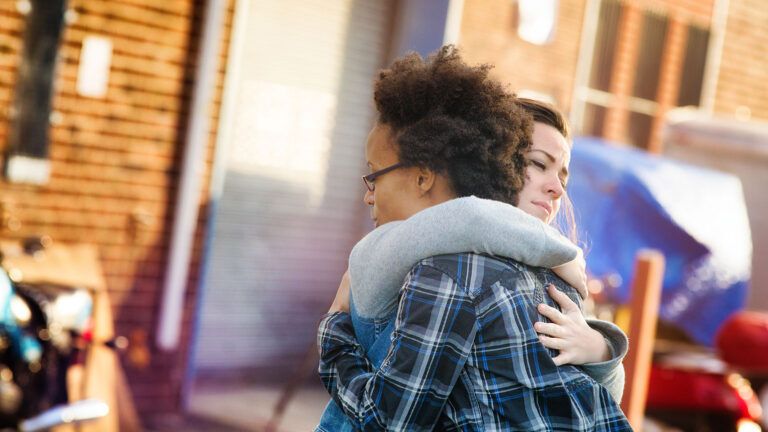I sat nervously in the waiting room of a psychologist. My husband Jerome’s plea for me to see a doctor had finally sunk in, yet not even Jerome knew the depth of my misery, how the sadness never went away, no matter how I tried to numb it with alcohol.
These feelings had been a part of me since I was 14, throughout high school and college, going on 10 years now. I kept to myself. Rarely did I talk to other people. I was afraid something terrible would happen if I got too close to anyone, even Jerome, our daughters and other family members. I didn’t know where these feelings were coming from. That’s what made them so frightening.
I picked up a magazine and flipped through it. The pictures that stared back at me were white smiling faces. Their lives were nothing like mine. I had grown up in Birmingham, Alabama, during the height of the civil rights struggles. Our city had been nicknamed Bombingham, because of all the bombs that had destroyed black homes, churches and businesses.
BROWSE OUR SELECTION OF BOOKS ON CHRISTIAN LIVING
My parents had done their best to shelter my brothers, sister and me. They may have talked with their friends about segregation and racism, but not with us. Daddy told us places we weren’t to go, like across the railroad tracks, and insisted my brothers escort me everywhere. I questioned why there were so many rules. But I didn’t know to be afraid, not then.
Church was the one place I was allowed to be on my own. We went to the Sixteenth Street Baptist Church downtown. I’d met Cynthia, my best friend, there.
I remember being baptized at 13. When the pastor lifted me from the water I blinked and looked up into Jesus’ tender face in the stained-glass window above the baptismal font. It seemed as if he were telling me, “I’m here, watching over you.”
Now I wondered if that was true. No matter how I prayed, God hadn’t eased my suffering. Lately I slept only a few hours at night. By morning I was exhausted. I picked at my food. I lost a lot of weight. My hands were always breaking out in rashes. How could I go on like this?
Jerome was constantly asking me, “What’s wrong?” But I couldn’t put the darkness inside of me into words. We’d been married six years now, with two beautiful girls. Why was my head filled with thoughts of death?
Jerome’s job had recently transferred us to Atlanta, Georgia. The only person I’d met was our next-door neighbor. I found myself drinking more and more.
A week earlier I’d mixed a mid-morning drink and sat down in front of the TV, just trying to get through another day. The girls were outside playing. A commercial came on: “Are you confused about life? Need someone to talk to?” It seemed to speak directly to me. “Call this number. Counselors are waiting to take your call.”
READ MORE: OSEOLA McCARTY’S LASTING LEGACY OF LOVE
I dialed the number. A woman answered. She was explaining the services they offered when Jerome came in. He’d forgotten some papers he needed for work. “Who are you talking to?” he asked. “It’s really early to be drinking.”
I told him I was talking with someone from a suicide hotline. “I just wanted someone to talk to,” I said. “I was lonely.”
“I think you need to see a doctor,” he said. I agreed.
My doctor referred me to a friend of his. I didn’t know initially that the friend was a psychologist. That’s how I ended up in a psychologist’s waiting room. A door opened next to me.
“Mrs. McKinstry,” the psychologist said. I wondered what he would ask me. Nobody I knew had ever been to a psychologist.
He led me back to a small office. He was a kindly older man. I told him I wasn’t sleeping, that nothing made me happy. He listened intently, nodding and taking notes. He asked what I did during the day and if I was drinking. Finally his eyes locked on mine.
“What you’re dealing with is called depression. It’s treatable, but you won’t survive if you keep on like this. You need to face your feelings.
“I can’t help but think there’s something, maybe in your past, you need to let go of,” he continued gently. “We need to figure out what’s bothering you.”
Driving home I heard his words repeat in my mind. What had happened to me? I remembered how happy and carefree I’d been as a child. Where had that girl gone?
Fact was, Daddy hadn’t been able to shield me from all of the violence that had happened in Birmingham when I was 14. Nearly every day I thought about my friends, the girls who’d been killed when our church was bombed. I tried not to dwell on the past, but it was always there.
I picked up my girls from the neighbor and got them settled playing in our yard. I went into the house, then to a closet where I had a box full of keepsakes.
There on the top was an old black Bible. My parents had given it to me the day I was baptized. I had always carried it to church. I had brought it with me that awful day, September 15, 1963…
It was Youth Sunday. I was laughing with Cynthia, Denise, Addie and Carole while they primped in front of the restroom mirror. I needed to leave. I was the Sunday School secretary. I had to get my attendance and offering report in by 10:30 A.M.
I ran up the stairs. The phone in the church office rang. I held the heavy black receiver up to my ear. A man’s voice said, “Three minutes,” then he hung up. What was that about?
I remembered I still needed to collect the report from the adult classes. I walked into the sanctuary, toward the stained-glass picture of Jesus.
Boom! The floor swayed. But the sound was muffled. Thunder? Glass fell at my feet. Someone shouted, “Hit the floor!” I dropped, flat on the ground. Silence. Then a stampede of feet. Police sirens.
I had to get outside. I looked up. There was a hole in the stained-glass window where Jesus’ face had been.
READ MORE: MISTY COPELAND—MADE TO DANCE
The streets were filled with people screaming and crying. Finally I saw Daddy behind a police barricade. We drove home in silence, too scared to say a word. How could anyone bomb a church? I only hoped no one had been hurt.
Late that afternoon our phone rang. Mom answered it. She was quiet and solemn as she listened to the caller. Then she hung up and turned toward us, her face filled with sorrow. “There were four girls in the restroom who never made it out,” she said.
My friends. It felt like my heart had stopped.
“It can’t be true,” I whispered.
Mom nodded. “I’m afraid it is,” she said. “They died.”
I remembered the strange phone call at the church. Had someone been trying to warn us? Or taunt us? Over the course of the evening—through friends and neighbors, the radio and the evening news—we pieced together what had happened.
But each bit of information only left me more stunned and frightened. There were people out there who wanted to kill us. They’d taken my friends from me. Bombed my church.
That night in bed I burrowed deep under the covers, but it was hours before I was able to sleep. It seemed there was no place safe anymore. An awful emptiness opened up inside of me.
The next morning Daddy made breakfast, like every morning. No one asked, “Carolyn, are you okay? Do you miss your friends? Do you want to talk about what happened?” Back then, there was no grief counseling. Loss was a part of life and you were supposed to stoically push through it.
I went to school on Monday and laid my head on my desk wishing I could block out the sadness, anger and confusion.
Now I knelt on the floor next to my closet. My body shook with emotions that had simmered inside of me for years. How could someone have bombed God’s house? Killed four innocent little girls? What kind of person was capable of such evil?
They had caused so many people so much pain. I’d never even gotten to say goodbye to my friends. My parents had asked if I wanted to go to the funeral. I said no, twice. I wanted to remember them as I had last seen them. But I did want the killers to hurt. I wanted them to feel the same pain that I felt inside.
God, I prayed, I am in so much pain. Please fix my body. Take away my cravings for alcohol. Please touch me with your healing so I can go forward.
I picked up my Bible, felt the weight of it in my hands. It fell open. There was an old church bulletin tucked inside. I looked at the date: September 15, 1963, the day of the bombing. I read through the hymn selections for that fateful morning, read the page numbers and spoke the names of the people who were to give the prayers.
Halfway down the page I saw the pastor’s sermon title: A Love That Forgives. There was a scripture reference, Luke 23:34. I flipped to the passage and slowly read the words: Father, forgive them, for they know not what they do.
Tears streamed down my cheeks. I thought of that stained-glass window, of Jesus reaching out to me. All these years I’d carried this burden inside me, without ever once… Forgive me for not coming to you before now, for not trusting you.
I tried to see the bombers as God saw them. I wept, thinking of someone so fearful that killing seemed the only option. Forgive them as you have forgiven me. I could feel the hardness in my heart melting, anger and bitterness flowing out of me.
Then the tiniest sensation—one I barely recognized. I ran outside to my girls, held them tight. I wanted to remember what it was like to be young again, carefree, life full of possibility.
My depression didn’t lift overnight. I’d taken only the first step of a long journey. I still had a lot to learn about the healing power of forgiveness. I kept returning to God in prayer and met again with the psychologist.
From that point on I stayed as busy as possible. Every day the girls and I went bike riding. I bought cookbooks and taught myself to bake. We joined a church and I raised money for a new nursery.
Slowly I began to see the world with new eyes. I reached out to others, even strangers, listening to them. I’d believed we’re all God’s children, and it became real to me—how loving and warm people are, how much we have in common, how it’s mainly ignorance that separates us.
Later I enrolled in divinity school so I could bring God’s message of love, forgiveness and reconciliation to the hearts of all, allowing God to use me—my experiences and voice—to deliver his words.
We moved back to Birmingham in 1978 and again became members of the Sixteenth Street Baptist Church. Every day visitors come from around the world to remember and reflect on the pivotal moments that changed a nation.
They come to see the place, to physically touch it and spiritually connect with it. The church holds a special status in the history of the civil rights movement. It remains a symbol of faith and hope for all who enter its doors.
For me it will always be a reminder of God’s infinite grace and love for all his children, and how we are given that love in order to forgive what seems unforgivable and release our burdens to him.
For more inspiring stories, subscribe to Guideposts magazine.





